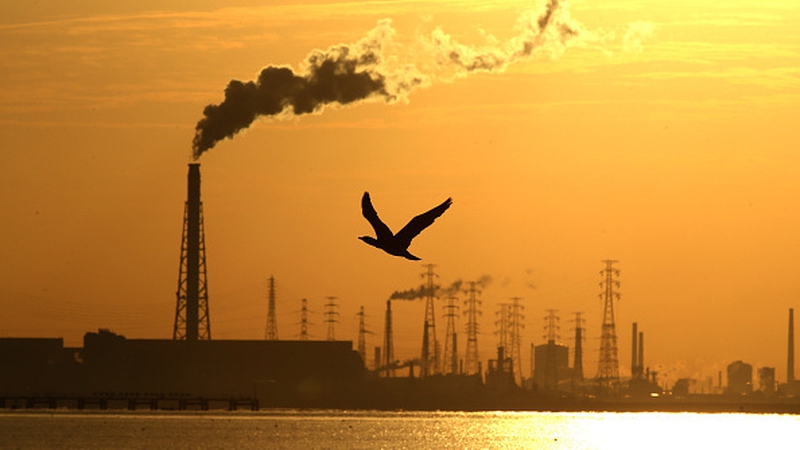The IPCC Needs to Engage
On Military and Conflict Emissions
Ellie Kinney / Conflict and Environment Observatory
(April 3, 2023) — The failure of the Intergovernmental Panel on Climate Change (IPCC) to mention military or conflict emissions in its recent synthesis report points to a deeper problem. Ellie Kinney explains why solving it will require a concerted effort from states, researchers and civil society. As the IPCC has made clear, the stakes couldn’t be higher.

Time to Act on Military Pollution and Climate Change
Ellie Kinney / Conflict and Environment Observatory
On March 20th, the Intergovernmental Panel on Climate Change published its latest climate change research synthesis report. IPCC Chair Prof. Hoesung Lee’s message was clear: “If we act now, we can still secure a liveable sustainable future for all.”
The report clearly states that the scale of what has been done so far is insufficient to tackle the climate crisis, and that current plans must be more ambitious. However, it’s not simply the contents of the report that are interesting, but also its omissions. COP27 demonstrated the rapidly growing attention on military and conflict emissions, yet they were absent from the IPCC’s final report.
The Missing Emissions
The IPCC’s report consists of peer-reviewed research, however its Summary for Policymakers is negotiated by states, with input from civil society. Two NGOs, the Friends World Committee for Consultation (FWCC), and the Center for International Environmental Law (CIEL), highlighted the absence of military emissions, proposing that they be addressed in the report. Following these interventions, Ukraine supported the idea of including a reference to the missing data as a footnote.
In response, Prof. Lee explained that military emissions were not considered in the report as it can only include information from within the working group reports of this research cycle. It’s understandable — the synthesis report is just that, it includes no new research. But where an omission is caused by data gaps resulting from a harmful reporting exemption, and exacerbated by a lack of academic research, a contextual footnote feels like an appropriate, if not essential, contribution.
The IPCC’s Responsibility
The most credible source of scientific information on the climate crisis, the IPCC works closely with the UN Framework Convention of Climate Change (UNFCCC) and sets the guidelines for national reporting. Its objective is to provide governments with the scientific information they need to develop climate policies. The IPCC is hugely influential, and its acknowledgement of the military emissions data gap would help capture the attention of governments, policymakers and academia, and help facilitate overdue change within the UNFCCC.
A Call to the Academic Community
The lack of attention this issue receives from organisations like the IPCC perpetuates a lack of research. While the IPCC does not conduct its own research, its position within climate change science makes it able to influence the focus of climate change research globally. But with frustrating circularity, unless the academic community publishes on military emissions, the topic won’t be addressed by the IPCC in its research and reporting cycle. In turn, this lack of visibility means researchers are less likely to study the topic, and funding bodies won’t support them to do so.
As highlighted in a 2022 Nature commentary, this frustrating cycle must be broken: “Independent research is paramount to keep militaries accountable and to uphold obligations made under the UNFCCC”. The commentary also highlighted the urgent need to support researchers to conduct independent analysis and provide evidence-based solutions, and to establish a commonly understood and verifiable means of accounting for military and conflict emissions.
As the scientific body on the climate crisis, the IPCC should be leading the conversation on tackling the military and conflict emissions gap.

Increasing Pressure
Political pressure is equally vital and NGOs have begun speaking out within the UNFCCC and IPCC. From FWCC and CIEL at the recent IPCC meeting, to Tipping Point North South’s COP27 side event on military and conflict emissions under the UNFCCC, to a recent joint NGO call on the Global Stocktake.
States are also beginning to focus on the issue. Ukraine supported the calls to include military emissions in the IPCC’s summary, and co-hosted the COP27 side event, where Moldova and Georgia also contributed. If state and civil society voices highlight the missing military emissions data, institutions like the IPCC and UNFCCC will eventually have to respond.
Change Is Needed — Urgently
But we cannot afford delays. The IPCC’s next synthesis report is due out in 2030. According to the IPCC, we have until 2030 to reduce global emissions by 43% if we are to limit warming to around 1.5°C.
Without immediate and deep reductions across all sectors — including militaries — 1.5°C will be beyond reach. No sector can manage what it doesn’t measure. Similarly, it is imperative that we develop the tools to understand how armed conflicts influence emissions.
Military emissions reporting is still voluntary, which results in poor quality data at best, and at worst, no data at all. The UNFCCC guidelines must change to close that gap and the IPCC, and the states, academics and NGOs that support it, have an essential part to play in leading that change.
Ellie Kinney is CEOBS’ military emissions campaigner.


